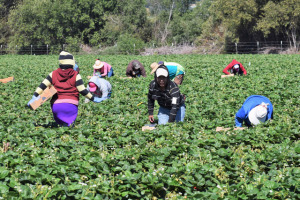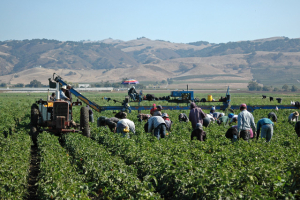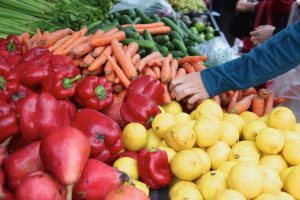The Future of the California Department of Food and Agriculture
June 16, 2009 Michael R. DimockWritten Testimony for the California Senate, Food and Agriculture Committee, Regarding the Budget and Future of the California Department of Food and Agriculture Presented by Michael R. Dimock, President, Roots of Change June 16, 2009 Sacramento, CA
Thank you Mr. Chairman and distinguished Committee Members.
I am Michael Dimock, President of the Roots of Change Fund (ROC). In the last 9 months, nearly 7,000 Californians have committed to work with ROC to create a sustainable food system in California by the year 2030. ROC engages the grass roots and grass tops, including the secretaries of USDA and CDFA, media, farmers and ranchers, food business and environmental leaders, farm labor organizers and urban agriculture advocates. We engage the full spectrum of people who know we can create a better food and farming system if we work together.
Our core funders include the Columbia, Heller, Kellogg and Packard foundations. Allied funders include Newman's Own Foundation, USDA and individual Californians. ROC offers fellowships, grants, contracts, convening and grant writing services to those individuals and organizations that work across sectors and outside traditional silos, in collaboration, to scale up sustainable food production and distribution or to develop model city, county, state and federal policies that will reshape the system.
We believe that the practical approach is to offer intelligent incentives that end the ecological destruction, health degradation, and poverty creation that are unintended consequences of our current industrial model of food production.
You may be aware of the California Roundtable on Agriculture and Environment, known as the CRAE. Roots of Change spawned the CRAE and we continue to provide the core funding of that unprecedented body of unlikely actors seeking common positions on policies that will move us toward a sustainable system.
The Stewardship Index for Specialty Crops project and numerous recommendations to state and federal policymakers have emerged from the CRAE. Secretary Kawamura and other top CDFA staff have been essential participants in CRAE's work.
Whether you are a food producer, environmentalist, labor or social justice advocate, and especially if you are a state or federal agency official, the CRAE is a positive force in our polarized and complex times.
ROC is also the source of a document, which I share with you today, entitled the Declaration for Healthy Food and Agriculture, endorsed by 20,000 citizens so far, which offers twelve principles to forge policies that will transform the system.
I understand that the current budget deficit requires decision makers to look at every option, but I guarantee that eliminating CDFA will not result in savings. Rather, it will erode the effectiveness of vital programs and stunt what I see as encouraging movement within agriculture that has been championed by the Department over the last several years.
We all know California is a top agricultural economy in the world, but most forget that the agriculture and food system is the literal bases of civilization. Food production is also the largest single human activity that harms the ecological systems that support life. We humans continue to under invest or mis-invest in this sector at our collective peril, particularly now.
As we enter a world of peak oil, rapid climate change, species extinction, and economic transformation, it is essential that the business, nonprofit, and government sectors develop a level of partnership, not seen since the Great Depression and World War II. We must collaborate to adapt and eliminate or vastly minimize the impacts of food production on the biosphere and rural communities. CDFA has been engaged in formation of new partnerships at an increasing pace for the last three years.
I do understand some of the frustrations that may have led this Committee to consider elimination of the Department. In my view, it has only recently begun to live up to its name, the Department of Food and Agriculture. In the past, its primary focus has been only on agriculture and the industrial producers who generate the most revenue, but often not the most beneficial outcomes when considering the broad spectrum of goals our food system must seek to achieve. It has, for too long, been the farming industry's department, but I see it gradually becoming the people's department, which is, from ROC's perspective, essential.
I do not blame the department alone, or the industry itself for the narrow focus of the past. Most Californians, most Americans, until very recently had forgotten the importance, meaning, and essential nature of agriculture and food. But thankfully that is changing.
The recent revamp of this Committee is a welcome and exciting manifestation of the change now underway. In you, ROC has a powerful new potential partner in the legislative branch, a complement to our maturing partnership with CDFA. We hope to work very closely with this Committee and CDFA to unleash a batch of innovative policy that will reframe our food and farming system.
Losing CDFA would be too disruptive and damaging for those of us who have worked for many years to improve the food system. Important and innovate relationships, projects, and directions have emerged in the last three years and they would be lost if the Department is eliminated.
You need CDFA too because it has proven its ability to leverage State dollars with philanthropic funds, user fees, and federal dollars in order to maximize their impact and to drive toward innovation. We cannot lose this ability in a moment when State government is insolvent. We need public-private partnerships to flourish now more than ever.
I believe that the State has for too long under invested in the food and farming sector. Given the scale and scope of California agriculture, the Department's budget of $300 million, with only $100 million of general fund money, is completely inadequate for a sector that produces $34 billion in farm gate revenue and feeds a vast proportion of the State, nation and world, a national security concern. If California hopes to retain it ability to produce food and to lower the long-term health, environmental and social costs that are undermining sustainability, we must invest more in food and farming. Invasive species prevention and containment is just one example.
I know that increases are impossible at this moment, but they will both be possible and essential in the future. Now is the time to rethink the Department and the types of investments California is making. I urge you to forego the idea of elimination and instead, deeply consider a new mission for the Department, one appropriate to the 21st Century.
ROC urges you to hold a series of hearings to revision CDFA and its mission, to reframe the relationships between the primary producers of food, the public, and the businesses that move food from field to table. Further, we propose that you orient this investigation around the overarching goal of creating healthy people, healthy ecosystems and vibrant communities based on healthy agriculture and food production.
I trust you are aware that Secretary Kawamura is leading a similar process within CDFA using primarily philanthropic dollars, some of which, ROC helped to bring to the Department from our core funders. Let's work together to model for the state and nation how the business and NGO communities, CDFA, and this Committee can cooperate to transform the way we farm and raise food, steward the natural world, and establish sustainable communities for future generations.
Thank you.



